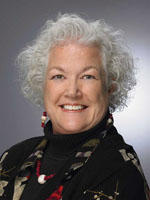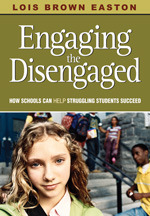Lois E. Brown Easton

Lois Brown Easton works as a consultant, coach, and author. She is particularly interested in learning designs for adults and for students. She recently retired as director of professional development at Eagle Rock School and Professional Development Center, Estes Park, Colorado. A project of the American Honda Education Corporation, Eagle Rock School is a year-round, tuition-free, residential high school for students who have not experienced success in traditional academic settings. The school provides educators who visit the Professional Development Center with experiences in innovative education.
As director, Easton designed and administered the professional development program for preservice and student teachers; practicing teachers and administrators; university and college students, both graduate and undergraduate; and researchers. She designed and administered an internship program for twelve young educators each year and an alternative licensure program accredited by the Colorado Department of Education.
Easton was director of Re:Learning Systems at the Education Commission of the States (ECS) from 1992 to 1994. Re:Learning was a partnership between the Coalition of Essential Schools (CES) at Brown University in Providence, Rhode Island, and ECS. The Coalition focuses on school-level restructuring based on the research on American high schools that Dr. Ted Sizer and others performed in the 1980s. ECS, an interstate compact that works with state policy makers to improve the quality of education throughout the country, partnered with CES in Re:Learning to orient reform efforts from “schoolhouse to statehouse” and to effect reform systemwide. Easton was director of the systemic side of the reform.
Prior to that, Easton served in the Arizona Department of Education as English/Language Arts Coordinator, establishing the role in the School Improvement Unit and directing the development of the Language Arts Essential Skills, the state’s first standards-based curriculum framework. She became Director of Curriculum and Instruction, and then, as Director of Curriculum and Assessment Planning, designed and implemented the Arizona Student Assessment Program (ASAP), which focused on systemic reform on the basis of curriculum standards aligned with state performance assessments. A middle school English teacher for 15 years, Easton earned her PhD at the University of Arizona. Her dissertation was a policy analysis of the ASAP. She has held state and national offices, particularly in language arts organizations. She was President of the Arizona English Teachers Association and was elected to the Secondary Steering Committee of the National Council of Teachers of English. She was cochair of the 2001 Conference of the National Staff Development Council in Denver. Easton has been a frequent presenter at conferences and a contributor to educational journals. Her book The Other Side of Curriculum: Lessons From Learners was published in 2001. She is editor of and contributor to Powerful Designs for Professional Learning, which was published in 2004.
As director, Easton designed and administered the professional development program for preservice and student teachers; practicing teachers and administrators; university and college students, both graduate and undergraduate; and researchers. She designed and administered an internship program for twelve young educators each year and an alternative licensure program accredited by the Colorado Department of Education.
Easton was director of Re:Learning Systems at the Education Commission of the States (ECS) from 1992 to 1994. Re:Learning was a partnership between the Coalition of Essential Schools (CES) at Brown University in Providence, Rhode Island, and ECS. The Coalition focuses on school-level restructuring based on the research on American high schools that Dr. Ted Sizer and others performed in the 1980s. ECS, an interstate compact that works with state policy makers to improve the quality of education throughout the country, partnered with CES in Re:Learning to orient reform efforts from “schoolhouse to statehouse” and to effect reform systemwide. Easton was director of the systemic side of the reform.
Prior to that, Easton served in the Arizona Department of Education as English/Language Arts Coordinator, establishing the role in the School Improvement Unit and directing the development of the Language Arts Essential Skills, the state’s first standards-based curriculum framework. She became Director of Curriculum and Instruction, and then, as Director of Curriculum and Assessment Planning, designed and implemented the Arizona Student Assessment Program (ASAP), which focused on systemic reform on the basis of curriculum standards aligned with state performance assessments. A middle school English teacher for 15 years, Easton earned her PhD at the University of Arizona. Her dissertation was a policy analysis of the ASAP. She has held state and national offices, particularly in language arts organizations. She was President of the Arizona English Teachers Association and was elected to the Secondary Steering Committee of the National Council of Teachers of English. She was cochair of the 2001 Conference of the National Staff Development Council in Denver. Easton has been a frequent presenter at conferences and a contributor to educational journals. Her book The Other Side of Curriculum: Lessons From Learners was published in 2001. She is editor of and contributor to Powerful Designs for Professional Learning, which was published in 2004.


